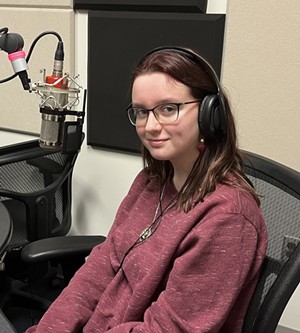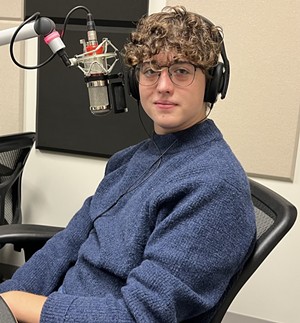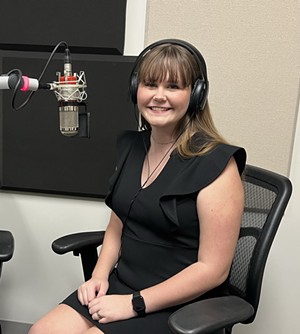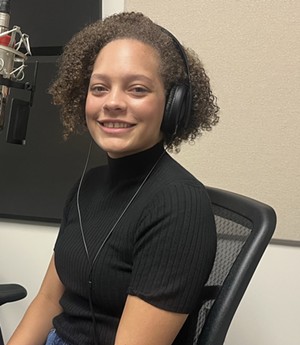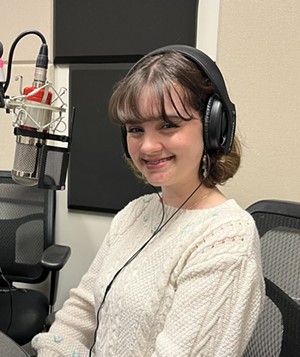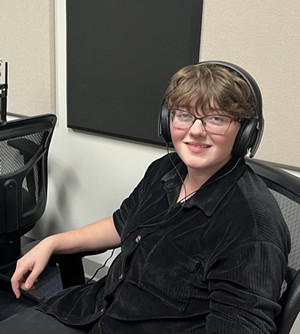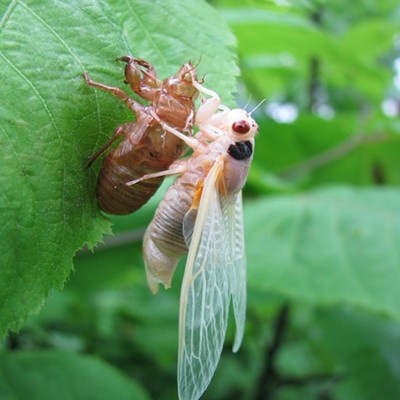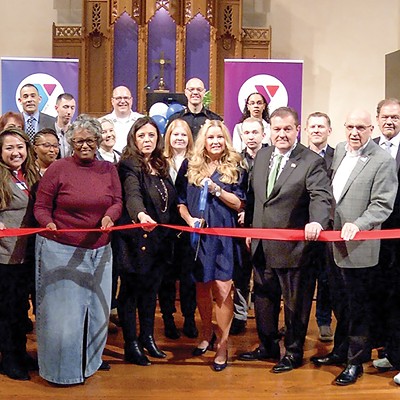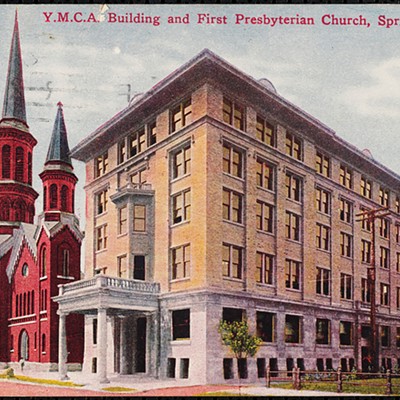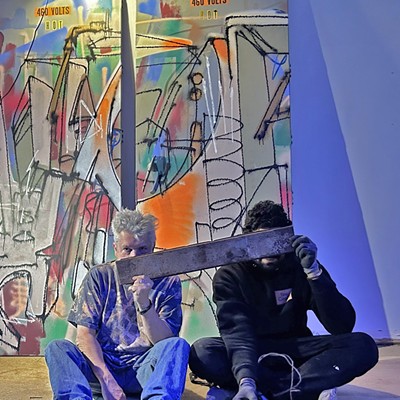This I Believe is an annual essay contest for high school seniors sponsored by NPR Illinois. Modeled after the program started by radio journalist Edward R. Murrow in 1951, students are invited to write an essay sharing their own personal beliefs. This year, 151 students within the NPR Illinois listening area submitted essays. Ten reviewers each read a group of essays and scored them based on originality, positivity and being personal and compelling. Judges then reviewed and discussed the highest rated essays to select the 2023 top 10 essays.
High school seniors in Springfield and many communities throughout the NPR Illinois listening area submitted essays. This year’s winners are from Glenwood, Hillsboro, Litchfield, Rochester and Sullivan high schools, A-C Central High School in Ashland, Meridian High School in Blue Mound and Unity Christian High School in Decatur.
This is the 18th year for This I Believe. The Rotary Club of Springfield Sunrise has been a partner from the beginning, providing a cash award to the 10 winners. This year each student will receive $500, thanks to donations from the Rotary Club of Springfield Sunrise, BLH Computers and Mary Beth and Harvey M. Stephens. The Abraham Lincoln Presidential Library and Museum (ALPLM) is hosting the culminating event, and Illinois Times is printing the winning essays.
Students will read their essays at the ALPLM on Thursday, Nov. 9. Doors open at 6 p.m. and the program starts at 6:30 p.m., followed by a dessert reception. The event is free and open to the public. Registration in advance is encouraged. To register for the Meet the Authors event, go to https://go.uis.edu/TIB.
Magic in the mundane
Avery Hopper – Sullivan High School
I believe that there is magic all around us. Ever since I was young, my mind had been filled with all the magical possibilities in the world. While these ideas were influenced by many things, I believe that this gentle fire of ideas was sparked and maintained by my great-aunt, who encouraged every creative thought I spoke of: Fairies spreading joy in the garden, elves creating wonderful inventions in the forests and sleepy dragons who rested among their riches in the mountains. We spoke of each of these things so vividly that they almost became real to me.
I started to look for magic in every aspect of my life. I found the most mystical of ideas in the most ordinary scenarios. I would picture ghosts blowing bubbles in my drink to make the carbonation, generous merfolk placing seashells at my feet in ocean waters on vacation and giants in the shapes of clouds. I thought of all these things, and they each filled me with a cheery sense of wonder.
My great-aunt was my biggest fan. She would read the crude scribbles of stories I wrote in twistable colored pencil, admire the rough crayon doodles I handed her and always listen to me babble on about the newest idea I'd come up with. She told me of classic and timeless stories, such as the Brothers Grimm fairy tales, she showed me games that contained magic creatures and she was always open to watching the most imaginative cartoons with me.
I wish so desperately that I could share the new stories I've written with her, that I could show her how much I've improved at art, and that I could listen to a story from her one last time, but even the most magical of people fade away one day. I lost my great-aunt to cancer a few years ago. I lost my first best friend and one of my biggest supporters, but I never lost my creative spirit. She would never forgive me if I did.
I know now that carbonation is from the liquid being infused with CO2, that finding seashells is more of a luck-based thing than I originally thought and that clouds just kind of look like that. However, I will never let go of the ideas that I used to have, nor will I stop thinking up new ones. Despite things having a more scientific side than I had hoped, I still find a childlike joy in the thought that there is a greater force of some kind out there, that things happen for a reason and that there is no such thing as truly impossible.
Humans are creative little creatures, and dreaming big is something we're known for. So why should I be told to stop daydreaming about the more whimsical things life might have to offer?
Being called weird is a complimentLeilani Essien –
Meridian High School
"What happened to my outgoing little girl?" It was a question I always found my mom asking me. "She learned that something is wrong with her," I would always respond in my head. I could never figure out what exactly was wrong with me, but I knew that my peers figured it out: I was out of place.
I felt this for the first time in first grade when I excitedly walked up to my friends, ready to join them for recess – and they turned me away, saying they didn't want me around that day, so they could have fun. I left, upset, and spent my time walking around the playground alone.
This pattern continued until the third grade, when I moved schools. My mom was optimistic that I would fit in there; but I, on the other hand, was dreading the moment when my classmates would take one look at me and decide I'm not good enough. When the first day of school rolled around, my fears were proven true. I once again spent my recesses alone, but this time on the swings. As I swung, I watched everyone on the playground and listened to their chatter. "I feel like an alien," I once thought while I watched a group of laughing girls pass by. "Maybe I am an alien."
After school, I would also sit alone, leaning against the window on a bumpy bus ride. I was doing just that when something cold and wet hit my head. I looked up to see that it was pouring outside, and the windows had been left hanging open. I, along with others on the bus, rushed to close the windows near me. Once I had closed my window, I looked around to see if everything else was shut and caught the eye of a girl with long red hair. "I like your shirt!" I blurted out, surprising myself. I mentally facepalmed. I didn't even actually like her shirt! Why did I say that? "Thanks," she said smiling, and suddenly my blatant lie didn't seem to matter anymore. "My name's Lydia, what's yours?"
Lydia became my first real friend. She never asked me to leave her alone, and she always laughed at my jokes. Being odd didn't seem to matter anymore because I had someone to be odd with. When Lydia would get called weird, she would always reply, "Thank you, that's a compliment." I started saying that as well – and eventually started to believe it.
When middle school came about, we went to different schools, but I still carried her words with me. I kept growing my confidence and became OK with standing out. I started joining activities like drama club, and I even became a cheerleader last year. It has now been 10 years since I met Lydia, and I still believe being called weird is a compliment.
The power of airports
Mark McDonald –
Rochester High School
I found myself winding through the infamous "mile-long line" at Chicago O'Hare International Airport. Frustration simmering within me, I whispered the famous words of every impatient child: "I hate this."
Yet, amidst the wait, something changed. I took a few moments to take in my surroundings: Families clustered with luggage, passports in hand; arrivals and departures boards disclosing imminent flights; flight attendants offering welcoming smiles at the gate. The symphony of rolling suitcases and the gleam of laminated floors underfoot; wall art that extends hospitality in forms such as "Hello" and "Welcome" in a multitude of languages. The flight staff's warm salutations, ushering you toward your destination with wishes for a joyful journey ahead. An uncanny sense of belonging pervades these spaces.
Growing up in an immigrant family, traveling thousands of miles to visit my grandparents was my norm. There were no grand Thanksgiving feasts or festive Christmas gatherings; no "Granny's visiting soon because Dad and I have work." Airports, for me, embodied a catalyst of cherished childhood memories – summer visits to grandma and grandpa's house in England, or mama and papa's in Hungary. Understandably, airports took on a deep personal significance, woven into the fabric of a childhood shaped by cross-continental connections. As I became more independent, airports assumed new roles: Igniting the flames of adventure, sparking discoveries, and kindling learning.
Airports also bring to mind the radiant smiles of Nicaraguan children who received soccer balls and school supplies from us during our visit — now many years ago. Airports conjure memories of the tradition of annual spring breaks spent with my mother, exploring various American cities, both to relax and to learn: Washington, D.C., unveiled the inner workings of the American democratic machine; Boston's historic sites painted a vivid picture of the Revolutionary War and our nation's formative years; San Francisco illuminated the rich tapestry of immigration and industry; and New York City bared its artistic soul through music and culture.
I believe there's an ethereal quality to the anonymity of airports. Yet, this very anonymity kindles a shared purpose – to reach one's destination collectively. Airports act as a crucible, uniting people from across the globe in their pursuit of diverse destinations – even when their intentions diverge. Moreover, airports signify potential beyond history. They encapsulate my aspiration to become an ambassador for my homeland – a global emissary, striking agreements, conveying messages and embracing diverse cultures.
Stepping back, I recognize that airports are not just personal to me. They have the power to inspire and connect people around the world. Airports, symbols of diplomatic collaboration, underscore respect and trust, allowing individuals to cross borders freely for leisure or exploration. But in a more figurative sense, airports foster emotions, experiences and inspiration, which are the keystones of human motivation.
In this intricate tapestry of experiences and aspirations, I find my unwavering belief in the power of airports. They are the vessels of dreams, the crossroads of cultures and the embodiment of limitless potential.
I believe in big mouths and small mouthpieces
Angel Trader –
Litchfield High School
As I blew air through the tiny mouthpiece of my trumpet, the sounds coming out just weren't correct. I was frustrated; I was ready to give up. All my fellow trumpet players were already hitting notes an octave higher than the note I was struggling with.
My band teacher could see all the built-up frustration I had. She then pulled out a new instrument I had never seen before. What could it be? My band teacher took the trumpet and offered me this new instrument to try. "The baritone," she called it. "It has a bigger mouthpiece. I think your mouth is too big for the tiny mouthpiece that comes with the trumpet." I was embarrassed, but now I realize this choice I made in the sixth grade was the best decision of my music career.
Music, for me, is an escape from reality. I can express myself through what I'm listening to, what and how I'm playing music, or what I have chosen to sing that day. It's a form of therapy that I have created for myself that is easily accessible. I have created friendships with people through band, choir and even just sharing a common love for music or a certain music genre. When I am stressing out about a school assignment or a math test, I put in my earbuds and lose myself to my newest favorite song as I write or study.
All this love came from the day I started playing the baritone. I have never been prouder to show off something new I've learned. As music became a more active part of my life, I realized that it was a love I wanted to share with other people. I serve as my marching band's drum major and share the love with my fellow band members as we learn a new drill. I am also able to share the love with the audience at football games as we perform our newest halftime show and with all the parents of our band members as they listen to our concert. I am honored to be a part of my school's Chamber Choir – an audition choir – where all our members share a common love for music. I can express these loves every day, in so many different settings, and I have found true happiness through this.
I have even decided to further share my love and study music. Music therapy is a form of interactive therapy that uses music to help the brain; this is what I have chosen to study in college. This way I can help others while also showing them how music can change lives. Music has changed my life for the better. It helped me find a healthy stress reliever and true happiness. I have now been in band for seven years and choir for six years. I couldn't imagine my life without music now. I believe in big mouths and small mouthpieces.
I believe in sewing
Andrew Doellman –
A-C Central High School
I believe in sewing. When I was a young child, I often had to deal with abusive and toxic situations. I can't count on my hands how many times I wanted to run away from it all. However, I would soon find my wonderful little escape – sewing.
When I was 9 years old, I lost my great-grandpa. I always looked up to him and I knew everyone else did too. After his death, I could only think about how horrible my great-grandma, his wife, must have felt. I decided that I wanted to make her a gift, something for her to look at and smile. I took up my needle and thread for the first time and embroidered her a small tea towel. She was so happy when she saw it, and she still has it hanging up to this day. I felt proud and accomplished for the first time in many years – and from that day forward, I was hooked.
I have often watched the needle on my sewing machine run in and out of the fabric, like a rabbit running through the woods. I continue to find solace in watching it. Sewing is a very therapeutic hobby for me. Sewing allows me to escape and just dream of a happier future.
Sewing is now a part of my daily life. Whenever I feel lost or depressed, my needle and thread sit, waiting to listen. My hands have learned all new skills; my pillows and clothes have become more intricate. I feel proud of what I can do. Showing off my work makes me feel good and has helped immensely to restore my self-confidence. I am my own amazing person, but I needed that needle and thread to show me that.
I'm much older than I was when I started using sewing as a refuge, but sewing never left my heart or my hands. Sometimes I just love to watch the needle plunge deep into the fabric before quickly emerging back through the top. The gentle and simple motion of the sewing machine is relaxing and a beautiful reminder of just how far I have come – and how far I have left to go. I know that whether by hand or machine, that sewing will always be there for me when I need it — my own little sanctuary.
I believe in long nails
Marianna Lowe –
Hillsboro High School
My hands are red and pruny from being in my mouth too long. There is a slight discharge of blood from one nail bed.
I can't stop.
I wish I could keep biting and picking at my fingers, but my hands feel like they are submerged in a tank of piranhas. My heart is swimming with them.
Biting my nails was the only way I knew how to cope with stress. I grew up in a house where the minute I heard a loud sound, I knew it was going to be a long night. My mother's boyfriend was on his first beer – and there were many more to come. First, it was doors smashing into their frames, then cabinets cracking from force, and sometimes it was glass being reduced to shards.
When this violent behavior occurred, I didn't have time to cower in a corner and pray that he wouldn't come into my room. I had to go into the inferno. I was the one who cleaned up the glass. I was the one clearing the endless Guinness cans off the counter. In between these chores, I gnawed at my fingers, savoring every bite that I took. I chewed them until they started bleeding and sometimes, I moved down my fingers, pulling and tearing at my skin. The mutilation was painful, but it was my reward. Like an extra suitcase, my habit followed me right out the door when we finally left.
Despite the distance and growth I've enjoyed since this time, there are days where I am in so much distress that all I want to do is rip my hands apart and bite them until they bleed. But then, I remember the pain, and I never want to feel it again. After all, I have learned to cope – through a lot of therapy, obviously – but also by getting my nails done. I would save up my money, head to the nail salon, and get the longest, practical nails available. Despite tending to wear drab clothes, my go-to nail colors became lavender, rosy future, and bubblegum pink.
Now, I look at my hands, and the corners of my lips reach my ears. I love having long nails. I love ceaselessly tapping on every surface in the house. I love the struggle of picking up change because I cannot get the right angle with my nails. And now, I love being able to just get my natural nails painted because they've been allowed to grow long enough to pass as acrylics.
This is why I believe in long nails. To me, they are so much more than a fashion accessory: Nails are a reminder to care for myself – the self that deserved care all along.
I believe in friendship bracelets
Sofia Flick – Glenwood High School
When I was about 8 years old, I went to a camp called PAVE. It was a theater camp, and at the end of every session, we would put on a play for all the parents. This particular session, there was a friendship bracelet fad. Our art teacher tried to teach us how to make them, but for some reason, I never "got it." The process of tying a bunch of strings together and ending up with a bracelet was too confusing. At the end of the session, the other kids in my group had arms covered in bracelets that they exchanged with each other. I pretended not to mind that all my friends had a physical symbol of their friendship while I didn't.
Eventually, that fad ended. Before I knew it, I was 16, and about to enter my junior year of high school. I hadn't thought about friendship bracelets for years, until my family was coming home from vacation. I was scrolling through Instagram when I saw a video of someone making a bracelet. I initially thought nothing of it and scrolled past. However, a few hours later, I found myself searching "how to tie friendship bracelet knots," and "how to read friendship bracelet patterns." By that evening, I had watched at least five tutorial videos.
I don't know what compelled me to learn to make friendship bracelets. I wish I could give that particular day sentimental value, but I think I was fueled through pure teenage boredom. The thing that kept me making these bracelets at first was the show I was in, Matilda. I was the oldest person playing a kid. The younger kids in the show looked up to me, and I wanted to make them all something to remember me by.
I really thought that would be the end of an era, and by the beginning of the school year I would be out of my bracelet phase, but I was wrong. Every show I was in, every new friend I made, even every time I was bored, I would make a bracelet. When I was a camp counselor at PAVE, I sat down with every kid that was interested and taught them how to make bracelets too. Now my arms are covered in bracelets, and even more line my bathroom counter.
As a kid, I wanted so badly to be like everyone else, and I felt like I stuck out – but not in a good way. Now, I embrace all those personality traits that younger me was ashamed of. I'm bold, I'm loud, I'm outgoing – and now, I try to pass along this acceptance to the younger kids who look up to me. I like that my love for bracelets makes me stand out, and I hope that by being myself, I influence the kids who look up to me to be proud of who they are.
Blood doesn't equal family
Emilie Harrison –
Unity Christian School
Sometimes a biological family isn't going to be the people you need in your life. In my case, I was adopted when I was 4 years old after a lengthy court battle between my family and my biological mother. From the beginning, she had said she couldn't take care of a child and didn't want one. As soon as it came time for the finalization, she brought my family to court and fought it. Instead of an easy process, it was long and painful for all parties. I still had to visit her, but I never remember considering her a parent of mine.
Soon, my birth mother lost interest. I stopped seeing her early on. When I realized I wasn't going to see her again, I sadly felt a sense of relief. At that time, I was just appreciative I would stop bouncing between homes. My memories of her have slipped away by now, and I've moved on. It has never mattered to me that I was adopted. Instead, I'm grateful for the gift of someone to care for me.
Unfit blood parents cause countless issues for their children by selfishly dragging the kids into their problems, just as mine did. It can be necessary for those children to find other parents – people ready and willing to take on the responsibility of having a child. Even friends can be family, anyone close ... you never know who will end up having that sort of connection with you.
I was given a second chance. As I grow, I've found better people to influence me and be a part of my life. Since I was privileged to have been adopted, I have access to a good education and support through anything that may happen – something I would have never experienced otherwise. Despite the absence of biological family in my life, I will never regret not knowing them. Blood or not, I believe family is what you make, not what you are born into.
I believe in breakups
Lily Churchwell -
Hillsboro High School
"We need to talk"
The glow behind the letters dims and goes dark. I'm at my friend Sophie's house, listening to Harry Styles's new album, when I get the "we need to talk" text from Ethan [name has been changed to protect the identity of jerk]. At first, I don't think anything of it, because we're already planning on hanging out with a group of friends next Sunday. However, when I start asking follow-up questions and getting terse answers, my heart starts to race. He is breaking up with me.
"I just think this is better for the both of us"
My stomach is being pushed down to the depths of the earth. Tears fall into the white porcelain sink. I look up into the mirror to see my glassy red eyes in the reflection before staring daggers through the obnoxious pink hand towel with a smiley face on it.
What did I do? How can I get him back? Did I change?
This breakup put me into a weirdly dark place, where I start thinking of myself through the eyes of others, rather than my own. When getting dressed, I intricately choose clothing that will be the most pleasing for dudes to look at. I strive to look effortless, even though I care too much because: Guys like girls who aren't afraid to show skin.
I also change my personality because: Guys don't like loud girls. I remain silent in class discussions, so my questions won't be viewed as dumb. This becomes a problem so severe that it affects my understanding of classroom material because I'm just too afraid to ask for help. Looking around, I start to see the signs. My grades are slowly dropping and my oversized Jonas Brothers T-shirt in the closet is collecting dust. This realization hit me like a bus – a bus going a trillion miles an hour.
Why was I doing this? I'm not planning on pursuing anything with any of these boys in my life, so why do I want to please them so much? Why did I become this person? I'm not like this.
This isn't me.
Now, I wear my Jonas Brothers shirt frequently and don't give it a second thought, because it pleases me. I want to be who I really am, rather than what I assume a guy wants me to be. A single text message turned my world upside down. However, I used my mental dilemma to better my self-perception. I believe in forming a sense of self that is only dependent on what makes me happy. This is why I believe in breakups.
Finding the quiet in your life
Amy Yang – Glenwood High School
I am not a morning person. I am the definition of a night owl, and yet I find myself waking up to the sound of my alarm ringing at 5 a.m. I reach over to stop the jarring sound and drag myself out of bed. Still half asleep, I go through the motions of my routine. After I mentally prepare myself for the day ahead of me (and wake myself up a little more), I slide into my car.
The drive is quiet; the roads are empty and all I hear is the sound of my music playing in the background. This moment of peace is one of the (few) benefits of waking up this early. There is a sense of serenity driving down empty roads, the sky still dark, not yet illuminated by the sun. I may be driving towards the ice rink, a place full of bright lights, sounds and expectations, but in these 20 short minutes, it is quiet.
I've always been called loud. My voice can be heard across rooms, through walls, permeating through the air. I laugh easily and talk even easier. Excitement causes my voice to have a mind of its own, words falling out of my mouth in quick succession. Even skating is dependent on sound, with my role being to perform according to my music. My life is defined by sound: When it's not filled with the sound of my own voice, it's filled with the sounds of others or music blasting through my headphones. It seems like there are rarely any moments of true silence in my life, but during this short 20-minute drive to the rink, my life quiets.
In an all-too-hectic world, it is often hard to justify taking a break. It feels out of place in such a fast-paced society. I'm often left feeling like the world is pushing me to match the constant movement it's experiencing, allotting no time for silence or breaks, lest it leaves me behind.
But during these slow, early morning drives, I'm reminded to admire the beauty in the quiet and to enjoy the peace that comes with stillness. And while it may be my still half-asleep self talking, in these early mornings I am no longer burdened by the stresses and fears that normally weigh me down. I find myself simply existing in the world.
My friends will think it's ironic that I am writing an essay about quiet when I am so rarely it, but quiet isn't necessarily just the absence of sound. Quiet is the calm right before my music starts at competitions. It's the world turning around me during a spin and the minute my blade lands back on ice after a jump. It's the moment the sun starts to rise after an all-nighter. Quiet is the 20-minute drive to the rink. And so, I believe that quiet is everywhere – you just have to allow yourself to slow down enough to recognize it.

